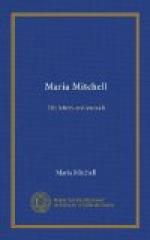“Dr. Whewell shook hands with us, and we stood. I was very tired, but we continued to stand. In an American gentleman’s house I should have asked if I might sit, and should have dropped upon a chair; here, of course, I continued to stand. After, perhaps, fifteen minutes, Dr. Whewell said, ‘Will you sit?’ and the four of us dropped upon chairs as if shot!
“The master is a man to be noted, even physically. He is much above ordinary size, and, though now gray-haired, would be extraordinarily handsome if it were not for an expression of ill-temper about the mouth.
“An Englishmen is proud; a Cambridge man is the proudest of Englishmen; and Dr. Whewell, the proudest of Cambridge men.
“In the opinion of a Cambridge man, to be master of Trinity is to be master of the world!
“At lunch, to which we stayed, Dr. Whewell talked about American writers, and was very severe upon them; some of them were friends of mine, and it was not pleasant. But I was especially hurt by a remark which he made afterwards. Americans are noted in England for their use of slang. The English suppose that the language of Sam Slick or of Nasby is the language used in cultivated society. They do not seem to understand it, and I have no doubt to-day that Lowell’s comic poems are taken seriously. So at this table, Dr. Whewell, wishing to say that we would do something in the way of sight-seeing very thoroughly, turning to me, said, ’We’ll go the whole hog, Miss Mitchell, as you say in America.’
“I turned to the young American girl who sat next to me, and said, ’Miss S., did you ever hear that expression except on the street?’ ‘Never,’ she replied.
“Afterwards he said to me, ’You in America think you know something about the English language, and you get out your Webster’s dictionary, and your Worcester’s dictionary, but we here in Cambridge think we know rather more about English than you do.’
“After lunch we went to the observatory. The Cambridge Observatory has the usual number of meridian instruments, but it has besides a good equatorial telescope of twenty feet in length, mounted in the English style; for Mr. Airy was in Cambridge at the time of its establishment. In this pretty observatory, overlooking the peaceful plains, with some small hills in the distance, Mr. and Mrs. Airy passed the first year of their married life.
“Professor Challis, the director, is exceedingly short, thick-headed (in appearance), and, like many of the English, thick-tongued. While I was looking at the instruments, Mrs. Airy came into the equatorial house, bringing Mr. Adams, the rival of Leverrier, [Footnote: See Chapter VII.]—another short man, but bright-looking, with dark hair and eyes, and again the thick voice, this time with a nasal twang. He is a fellow of Pembroke College, and master of arts. If Mr. Adams had become a fellow of his own college, St. John, he must have gone into holy orders, as it is called; this he was not willing to do; he accepted a fellowship from Pembroke.




